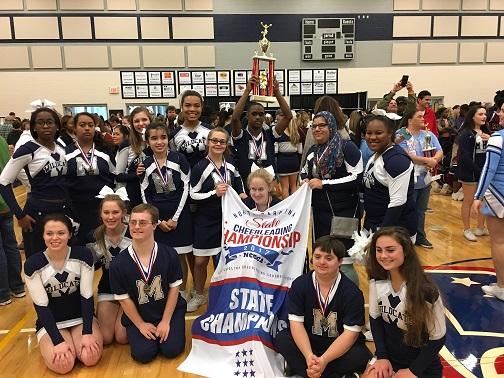Spread the Word to End the Word

Cheering to “We’re all in this Together” from High School Musical has become a crowd favorite at games and competitions. Those with disabilities did not ask to be born that way, and they deserve to be treated kindly.
March 10, 2017
The goal of the Spread the Word to End the Word movement is to raise the consciousness of our society of the harmful effects of using the dehumanizing word “retard(ed).” The movement encourages people to pledge to stop using the R-word. The campaign is aimed towards schools in hopes that students and faculty will rally and pledge their support. Spread the Word to End the Word is an annual movement; the day of awareness is always on the first Wednesday of every March. This movement is important because people with intellectual disabilities should not have to feel any different than they already do; they are human and deserve to be treated as such.
Spread the Word to End the Word was created by youth with and without intellectual disabilities who participated in the Special Olympics. The youths’ motivation for creating the campaign was a united passion to promote the positive contributions people with intellectual disabilities make to communities around the world. They also hoped to make the world a more accepting place for all people by pledging to stop using the R-word.
To senior Rachel Scott, Spread the Word to End the Word is an important movement that everyone should be apart of. Rachel helps coach the Elite Wildcats and is also in PEPI, so the cause is especially important to her. “I work with special needs kids everyday and I’m beyond grateful and blessed for that opportunity. I get to see how happy these kids are, and how positive they are with anything thrown their way. One of my dearest friends is special needs, and he’s taught me to keep a smile on my face and be happy every single day, no matter the circumstance. He has taught me to be a better person too. I don’t agree with people calling others ‘retarded’ because people that actually are mentally handicapped are amazing people, and using that terminology dulls the kind of people they really are,” she said.
Co-teacher and coach of the Elite Wildcats, Ms. Pitman said, “I’ve always wanted to work with students that have a disability, simply because I love to see students who know that they struggle, overcome those obstacles. They don’t let the fact that whatever they’re disability is, whether it’s something small or something large, ever hold them back. It doesn’t come easy to them, so it’s just great to see when they actually are successful and just see how proud they are of themselves.”
Ms. Pitman is a strong advocate for the campaign and believes the R-word should not be used: “ I think what people don’t realize is when you’re calling someone retarded, you’re basically saying they’re stupid. You’re assuming that these students, just because they’re different from you, are also stupid. That’s not true. They are smart; they just learn a little different. So one of things that we really wanted to jump on, since it’s a national campaign, is to end the fact that people are using it as a common word. It’s basically degrading someone who does have a disability, who wasn’t asked to be born like that. You’re basically making fun of them, and in this day and age, it’s affecting a bunch more people than what you realise. We just really need to stop using the word.”
If you wish to pledge and support the elimination of the derogatory use of the R-word from everyday speech and promote the acceptance and inclusion of people with intellectual disabilities, visit this link. http://www.r-word.org/r-word-pledge.aspx











